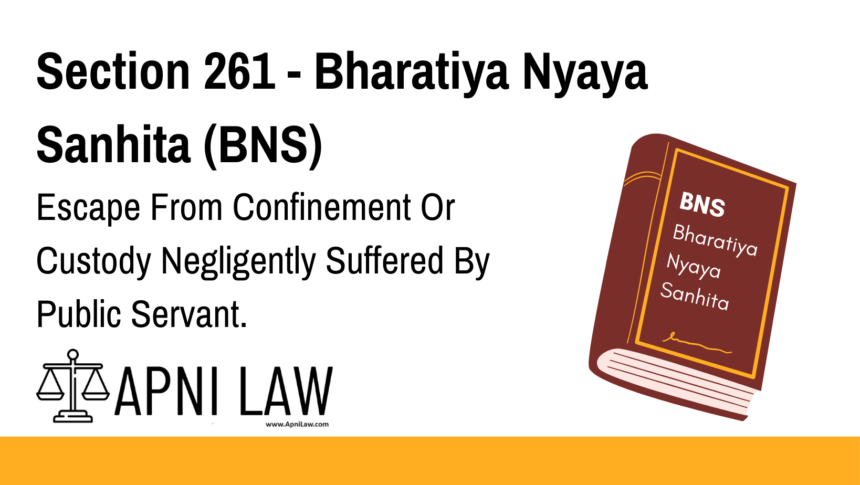Code: Section 261 BNS
Whoever, being a public servant legally bound as such public servant to keep
in confinement any person charged with or convicted of any offence or lawfully committed
to custody, negligently suffers such person to escape from confinement, shall be punished
with simple imprisonment for a term which may extend to two years, or with fine, or with
both.
Explanation of Section 261 BNS
Section 261 of the Bharatiya Nyaya Sanhita (BNS) addresses the issue of negligence by public servants responsible for the confinement of individuals. It criminalizes the act of negligently allowing an individual—who is charged with, convicted of, or lawfully committed to custody—to escape from confinement.
This provision ensures that public servants responsible for the security of prisoners or individuals in lawful custody are held accountable if their lack of due diligence results in an escape. It emphasizes the importance of proper procedures, security measures, and vigilance in correctional facilities.
Key Elements of the Offence
- Public Servant: The offence applies to individuals holding official positions, such as:
- Police officers
- Prison officials
- Correctional officers
- Any government official responsible for custody
- Legal Duty to Maintain Confinement: The person must be:
- Charged with or convicted of an offence, or
- Lawfully committed to custody.
- Negligence: The public servant must have negligently failed to:
- Prevent the escape, or
- Maintain proper security measures.
- Punishment:
- Simple imprisonment for up to 2 years, or
- Fine, or
- Both.
Illustrations
Example 1: Jailor’s Negligence Leads to Escape
A jailor fails to lock the cell door properly of an inmate serving a 10-year sentence. The inmate escapes easily as a result. The jailor can be punished under Section 261 with up to 2 years of imprisonment or a fine, or both.
Example 2: Police Officer’s Lapse During Custody
A police officer leaves the handcuffs loose on a prisoner being transported. The prisoner manages to escape from the vehicle. This negligent act can lead to prosecution under Section 261.
Example 3: Prison Staff Ignoring Security Protocols
A group of prison staff ignores regular security checks, which allows a prisoner to escape through an unlocked gate. The staff involved can be held liable for negligence under Section 261.
Common Questions and Answers on Section 261 BNS
1. What constitutes negligence under Section 261?
- Answer: Negligence refers to the failure to exercise reasonable care to prevent the escape of a person in custody. This includes ignoring security protocols, poor supervision, or failing to secure confinement areas properly.
2. Who can be punished under Section 261?
- Answer: Any public servant legally responsible for maintaining confinement, including police officers, prison guards, and correctional officials.
3. Is intent required for the offence under Section 261?
- Answer: No, the offence is based on negligence, not intent. Even if the public servant did not intend for the escape to happen, they can still be held liable if they were careless or inattentive in performing their duties.
4. What is the maximum punishment under Section 261?
- Answer: The maximum punishment is simple imprisonment for 2 years, a fine, or both.
5. Can a public servant be punished if the escape happened due to unforeseen circumstances?
- Answer: No, if the escape was due to unforeseen circumstances beyond the control of the public servant and not due to negligence, they may not be held liable under Section 261.
Conclusion
Section 261 of the Bharatiya Nyaya Sanhita ensures that public servants responsible for the custody of individuals are held accountable for any negligence that leads to an escape from confinement. It reinforces the importance of vigilance, proper security measures, and adherence to protocols to maintain the integrity of the justice system.








